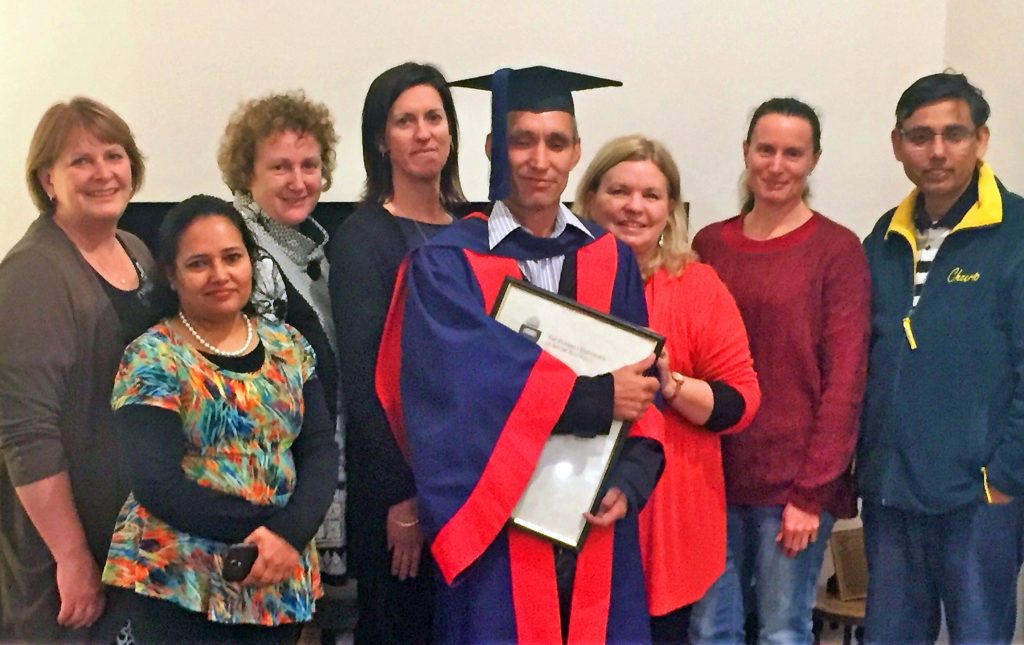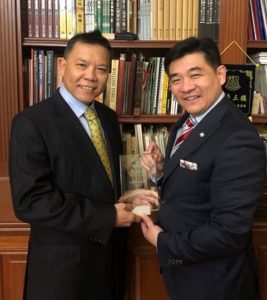
German sustainability centre turns to a Flinders sociology guru, a major clinical trial recruitment paper is published, accomplished medical professor wins again, and group effort sees students author a practical chapter on post-doctorate success.
Proof in the networking
A group of doctoral students together with their supervisor, Associate Professor Kerry Bissaker, have published a chapter in an international book ‘Getting the most out of your doctorate, The Importance of Supervision, Networking, and Becoming a Global Academic’ (Emerald Publishing Group.)
As evidence of the value of their topic: ‘The Power of an Effective Community in Creating Networked Researchers: Outcomes beyond a Thesis’, the opportunity to contribute the chapter arose following a conversation between the book’s editor Mollie Dollinger and one of Associate Professor Bissaker’s doctoral students Sue Kupke, at the Quality in Postgraduate Research Conference in Adelaide last year. Ms Kupke and doctoral colleagues Divya Dawadi and Jo Shearer presented a paper at the conference on the power of the group supervision model led by Associate Professor Bissaker.
The chapter focuses on the value of working in collaboration with others to not only stay on track with a research topic, but also develop knowledge of a broader range of methodologies, research strategies and importantly, the valuable skills involved in providing feedback and communicating research processes and outcomes.
“The skills developed through the group model have served graduates well as they take on supervision roles,” Associate Professor Bissaker says.
The book includes contributions from international authors and provides advice from selected supervisors on how to succeed beyond the doctorate. It is available to read or download at Emerald Insight.

Germany seeks out Flinders sociology expert
Dr Suzi Adams (Sociology) has joined the new ‘Futures of Sustainability’ Centre for Advanced Studies at the University of Hamburg as an inaugural Senior Research Fellow (October-December 2019).
The Centre is interested in developing a social imaginaries approach to ecological futures and has invited Dr Adams to contribute her expertise to the articulation of an overarching framework. During her visit, Dr Adams will present a lecture, conduct a postgraduate workshop on social imaginaries, and participate in a conference on ecological futures.
Highly awarded Professor wins again

Academic Status holder and alumnus Professor Edward (Ted) Mah (BMBS ‘84 and DM (Research) ’94) has been awarded the 2019 Australian Medical Association (SA) for Outstanding Service to Medicine at the AMA (SA) Gala Dinner on Saturday 11 May 2019.
Professor Mah delivers hand, elbow, shoulder and microsurgery services in Adelaide. He is the Past President of the Asia Pacific Orthopaedic Association and has been involved in Orthopaedic training in many Asia Pacific countries. A former Head of Orthopaedics and Trauma Service at the Lyell McEwin Hospital and Head of Hand and Upper Limb Service at The Queen Elizabeth Hospital, Professor Mah advocates social orthopaedics, as well gender and cultural diversity in surgical training.
Recruitment study published as AUSPICE ramps up
A paper co-authored by Professor Derek Chew has been published in the Medical Journal of Australia as part of the ‘Australian Study for the Prevention through Immunisation of Cardiovascular Events’ (AUSPICE), which is researching the ability of the pneumococcal vaccine to reduce the risk of heart attack and stroke.
This initial study explored the effectiveness of strategies for recruiting participants for large randomised controlled trials in Australia, recruiting 4725 of the 6000 people needed for the AUSPICE clinical trial in the process.
The project found trial participation rates are low, and recommended multiple concurrent methods to maximise recruitment. The authors noted little benefit of social media advertising in their older target age group.
In the study, a large number of invitations and reminders were mailed by the Australian Department of Human Services to people in the Medicare database aged 55–60 years. This was supplemented by asking invitees to extend the invitation to friends and family and by Facebook advertising.
Despite the minimal study burden, participation rate was just 3% (around 10% of eligible people) and only 16% of eventual participants responded in the first two weeks. Neither Facebook advertising nor asking participants to invite others boosted participation levels.
This Monday 20 May marked International Clinical Trials Day, celebrating the dedication of researchers, clinical trial support teams and members of the community, who work together tirelessly to improve health outcomes.
With participation rates for clinical research trials on a decades-long downward trend, finding optimal ways to reach and engage study participants is vital.

